Leadership Theories: Trait vs. Process - A Personal Perspective
VerifiedAdded on 2022/08/13
|5
|1039
|40
Essay
AI Summary
This essay delves into the multifaceted concept of leadership, beginning with the student's initial understanding and evolving through course materials and readings. It defines leadership as the influence leaders exert on employees, emphasizing empowerment and motivation to achieve organizational goals. The essay explores key definitions of leadership, highlighting social influence and the importance of empowering team members. It then examines the leadership debate, contrasting the belief that leadership skills are innate versus learned. Two prominent leadership theories, trait-based and process leadership, are discussed, with the former emphasizing inherent traits and the latter focusing on skill development and experience. The author integrates these perspectives, arguing that leadership is a result of both experience and inherent characteristics, drawing on personal observations to support this viewpoint. References to relevant academic sources are included to support the arguments.
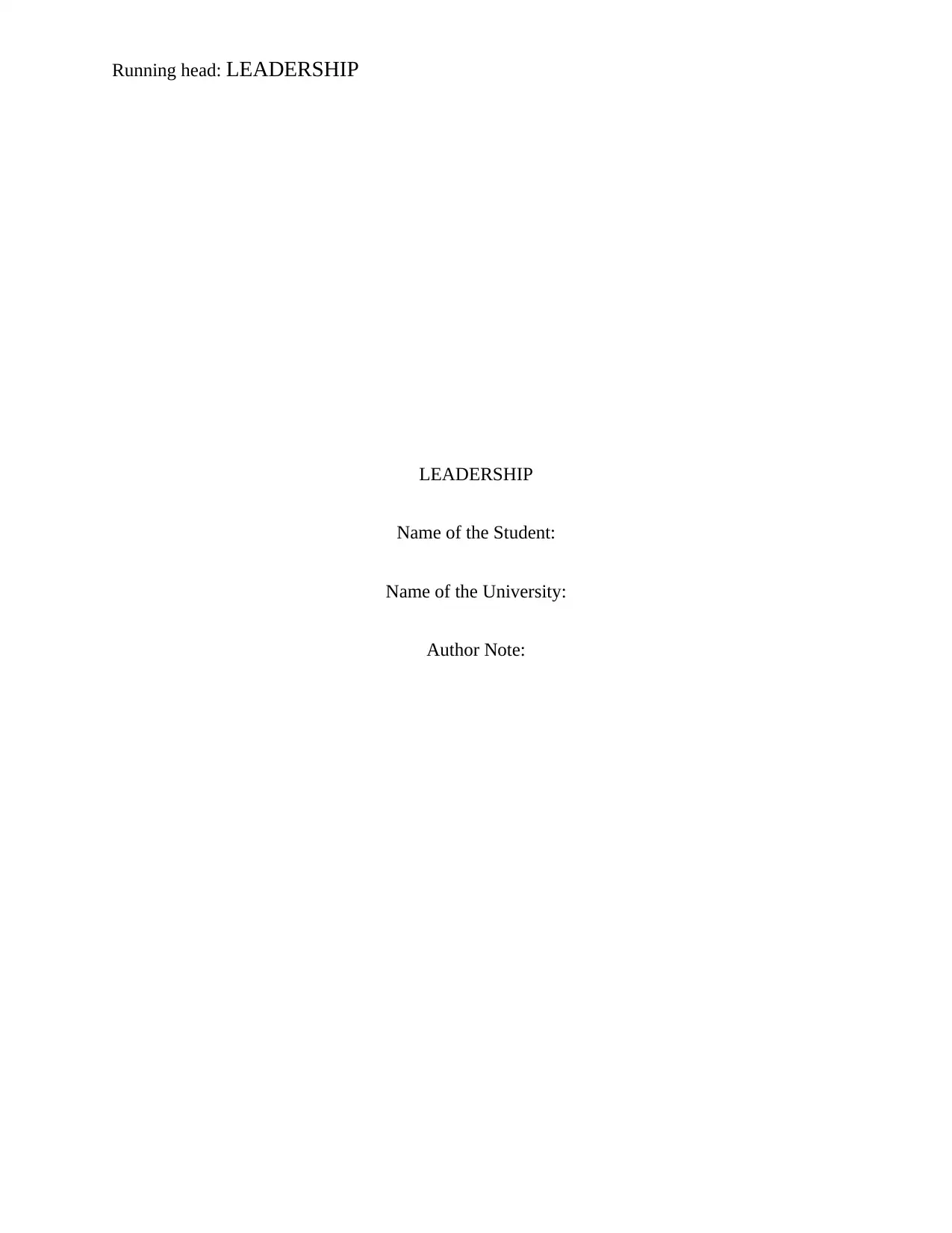
Running head: LEADERSHIP
LEADERSHIP
Name of the Student:
Name of the University:
Author Note:
LEADERSHIP
Name of the Student:
Name of the University:
Author Note:
Paraphrase This Document
Need a fresh take? Get an instant paraphrase of this document with our AI Paraphraser
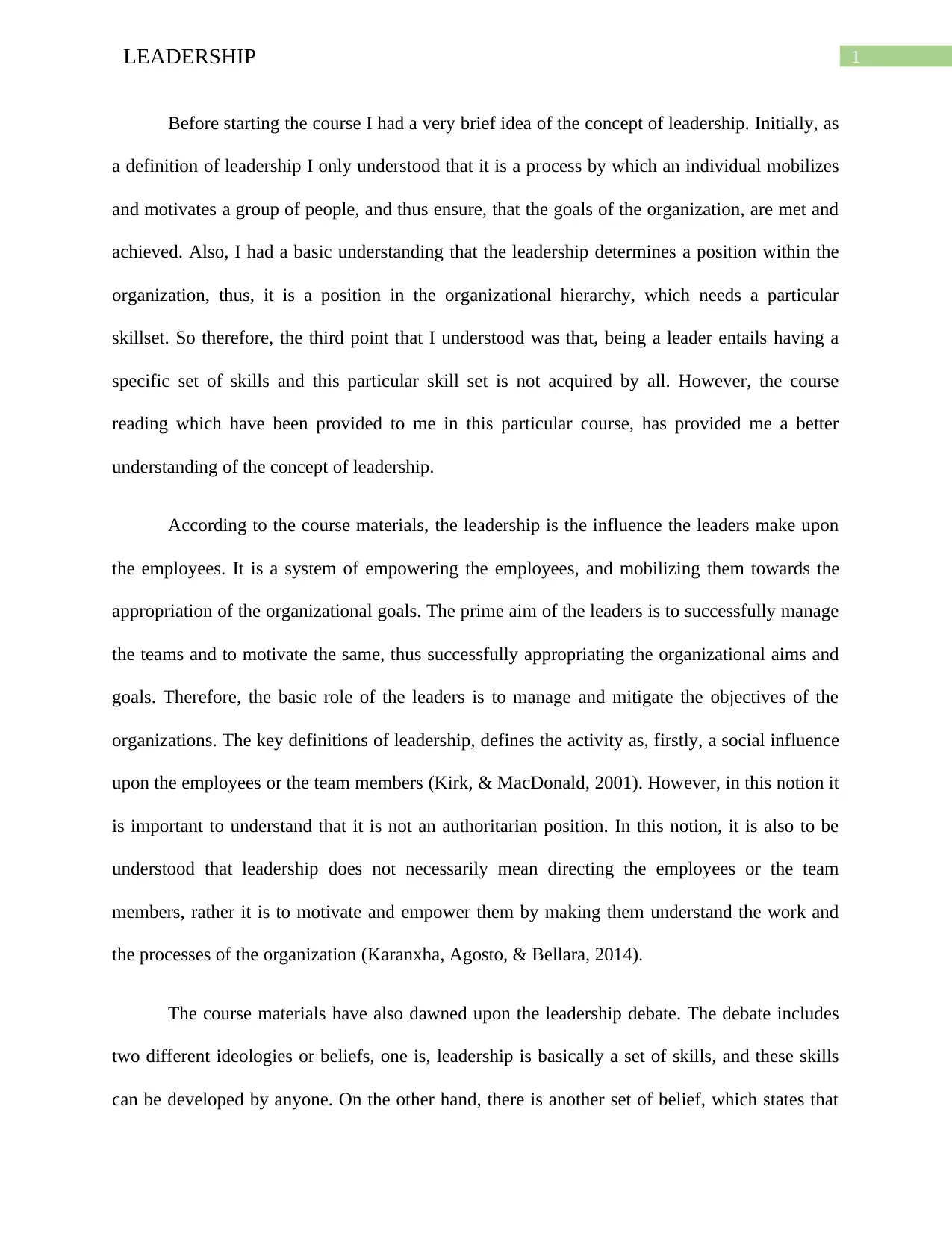
1LEADERSHIP
Before starting the course I had a very brief idea of the concept of leadership. Initially, as
a definition of leadership I only understood that it is a process by which an individual mobilizes
and motivates a group of people, and thus ensure, that the goals of the organization, are met and
achieved. Also, I had a basic understanding that the leadership determines a position within the
organization, thus, it is a position in the organizational hierarchy, which needs a particular
skillset. So therefore, the third point that I understood was that, being a leader entails having a
specific set of skills and this particular skill set is not acquired by all. However, the course
reading which have been provided to me in this particular course, has provided me a better
understanding of the concept of leadership.
According to the course materials, the leadership is the influence the leaders make upon
the employees. It is a system of empowering the employees, and mobilizing them towards the
appropriation of the organizational goals. The prime aim of the leaders is to successfully manage
the teams and to motivate the same, thus successfully appropriating the organizational aims and
goals. Therefore, the basic role of the leaders is to manage and mitigate the objectives of the
organizations. The key definitions of leadership, defines the activity as, firstly, a social influence
upon the employees or the team members (Kirk, & MacDonald, 2001). However, in this notion it
is important to understand that it is not an authoritarian position. In this notion, it is also to be
understood that leadership does not necessarily mean directing the employees or the team
members, rather it is to motivate and empower them by making them understand the work and
the processes of the organization (Karanxha, Agosto, & Bellara, 2014).
The course materials have also dawned upon the leadership debate. The debate includes
two different ideologies or beliefs, one is, leadership is basically a set of skills, and these skills
can be developed by anyone. On the other hand, there is another set of belief, which states that
Before starting the course I had a very brief idea of the concept of leadership. Initially, as
a definition of leadership I only understood that it is a process by which an individual mobilizes
and motivates a group of people, and thus ensure, that the goals of the organization, are met and
achieved. Also, I had a basic understanding that the leadership determines a position within the
organization, thus, it is a position in the organizational hierarchy, which needs a particular
skillset. So therefore, the third point that I understood was that, being a leader entails having a
specific set of skills and this particular skill set is not acquired by all. However, the course
reading which have been provided to me in this particular course, has provided me a better
understanding of the concept of leadership.
According to the course materials, the leadership is the influence the leaders make upon
the employees. It is a system of empowering the employees, and mobilizing them towards the
appropriation of the organizational goals. The prime aim of the leaders is to successfully manage
the teams and to motivate the same, thus successfully appropriating the organizational aims and
goals. Therefore, the basic role of the leaders is to manage and mitigate the objectives of the
organizations. The key definitions of leadership, defines the activity as, firstly, a social influence
upon the employees or the team members (Kirk, & MacDonald, 2001). However, in this notion it
is important to understand that it is not an authoritarian position. In this notion, it is also to be
understood that leadership does not necessarily mean directing the employees or the team
members, rather it is to motivate and empower them by making them understand the work and
the processes of the organization (Karanxha, Agosto, & Bellara, 2014).
The course materials have also dawned upon the leadership debate. The debate includes
two different ideologies or beliefs, one is, leadership is basically a set of skills, and these skills
can be developed by anyone. On the other hand, there is another set of belief, which states that
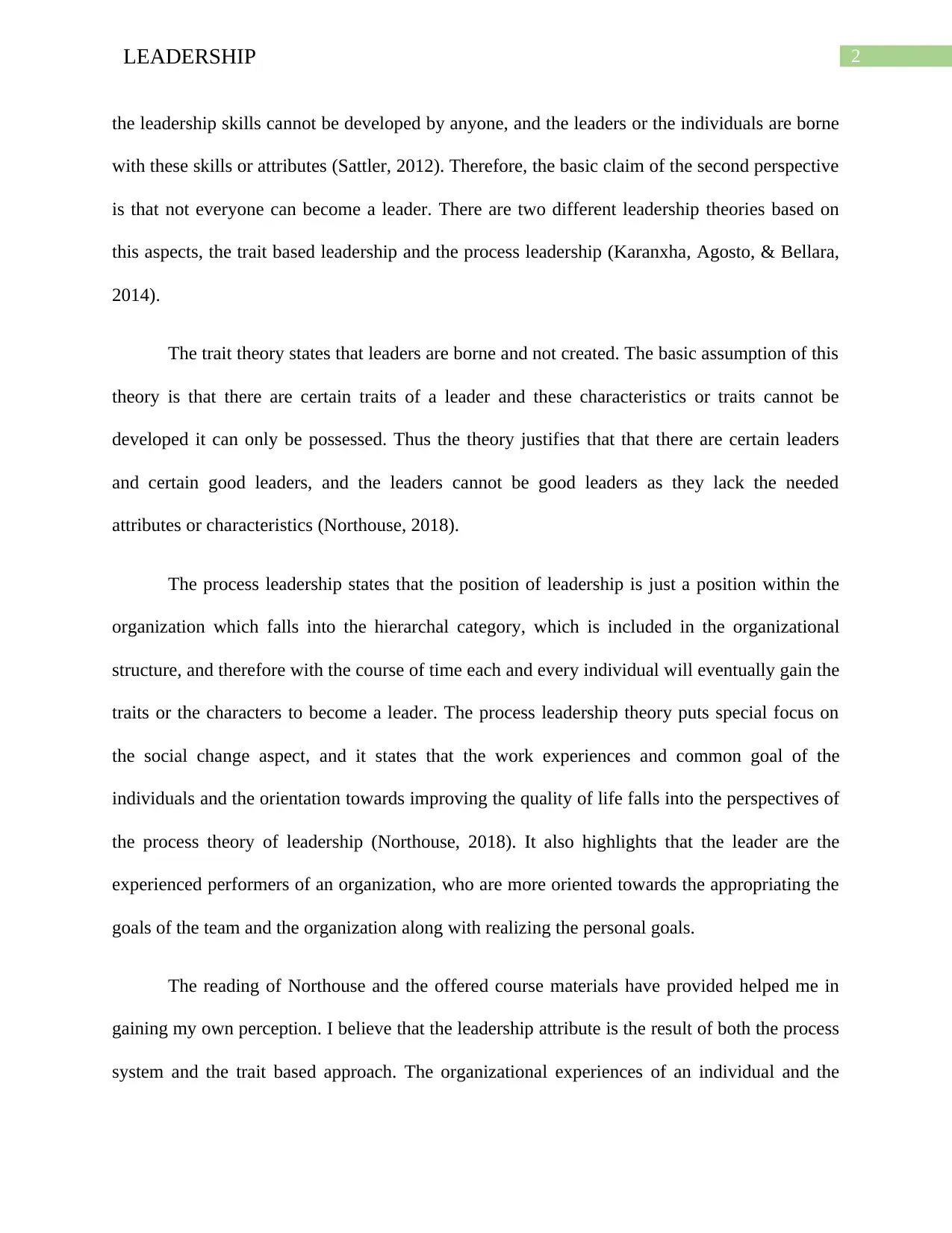
2LEADERSHIP
the leadership skills cannot be developed by anyone, and the leaders or the individuals are borne
with these skills or attributes (Sattler, 2012). Therefore, the basic claim of the second perspective
is that not everyone can become a leader. There are two different leadership theories based on
this aspects, the trait based leadership and the process leadership (Karanxha, Agosto, & Bellara,
2014).
The trait theory states that leaders are borne and not created. The basic assumption of this
theory is that there are certain traits of a leader and these characteristics or traits cannot be
developed it can only be possessed. Thus the theory justifies that that there are certain leaders
and certain good leaders, and the leaders cannot be good leaders as they lack the needed
attributes or characteristics (Northouse, 2018).
The process leadership states that the position of leadership is just a position within the
organization which falls into the hierarchal category, which is included in the organizational
structure, and therefore with the course of time each and every individual will eventually gain the
traits or the characters to become a leader. The process leadership theory puts special focus on
the social change aspect, and it states that the work experiences and common goal of the
individuals and the orientation towards improving the quality of life falls into the perspectives of
the process theory of leadership (Northouse, 2018). It also highlights that the leader are the
experienced performers of an organization, who are more oriented towards the appropriating the
goals of the team and the organization along with realizing the personal goals.
The reading of Northouse and the offered course materials have provided helped me in
gaining my own perception. I believe that the leadership attribute is the result of both the process
system and the trait based approach. The organizational experiences of an individual and the
the leadership skills cannot be developed by anyone, and the leaders or the individuals are borne
with these skills or attributes (Sattler, 2012). Therefore, the basic claim of the second perspective
is that not everyone can become a leader. There are two different leadership theories based on
this aspects, the trait based leadership and the process leadership (Karanxha, Agosto, & Bellara,
2014).
The trait theory states that leaders are borne and not created. The basic assumption of this
theory is that there are certain traits of a leader and these characteristics or traits cannot be
developed it can only be possessed. Thus the theory justifies that that there are certain leaders
and certain good leaders, and the leaders cannot be good leaders as they lack the needed
attributes or characteristics (Northouse, 2018).
The process leadership states that the position of leadership is just a position within the
organization which falls into the hierarchal category, which is included in the organizational
structure, and therefore with the course of time each and every individual will eventually gain the
traits or the characters to become a leader. The process leadership theory puts special focus on
the social change aspect, and it states that the work experiences and common goal of the
individuals and the orientation towards improving the quality of life falls into the perspectives of
the process theory of leadership (Northouse, 2018). It also highlights that the leader are the
experienced performers of an organization, who are more oriented towards the appropriating the
goals of the team and the organization along with realizing the personal goals.
The reading of Northouse and the offered course materials have provided helped me in
gaining my own perception. I believe that the leadership attribute is the result of both the process
system and the trait based approach. The organizational experiences of an individual and the
⊘ This is a preview!⊘
Do you want full access?
Subscribe today to unlock all pages.

Trusted by 1+ million students worldwide
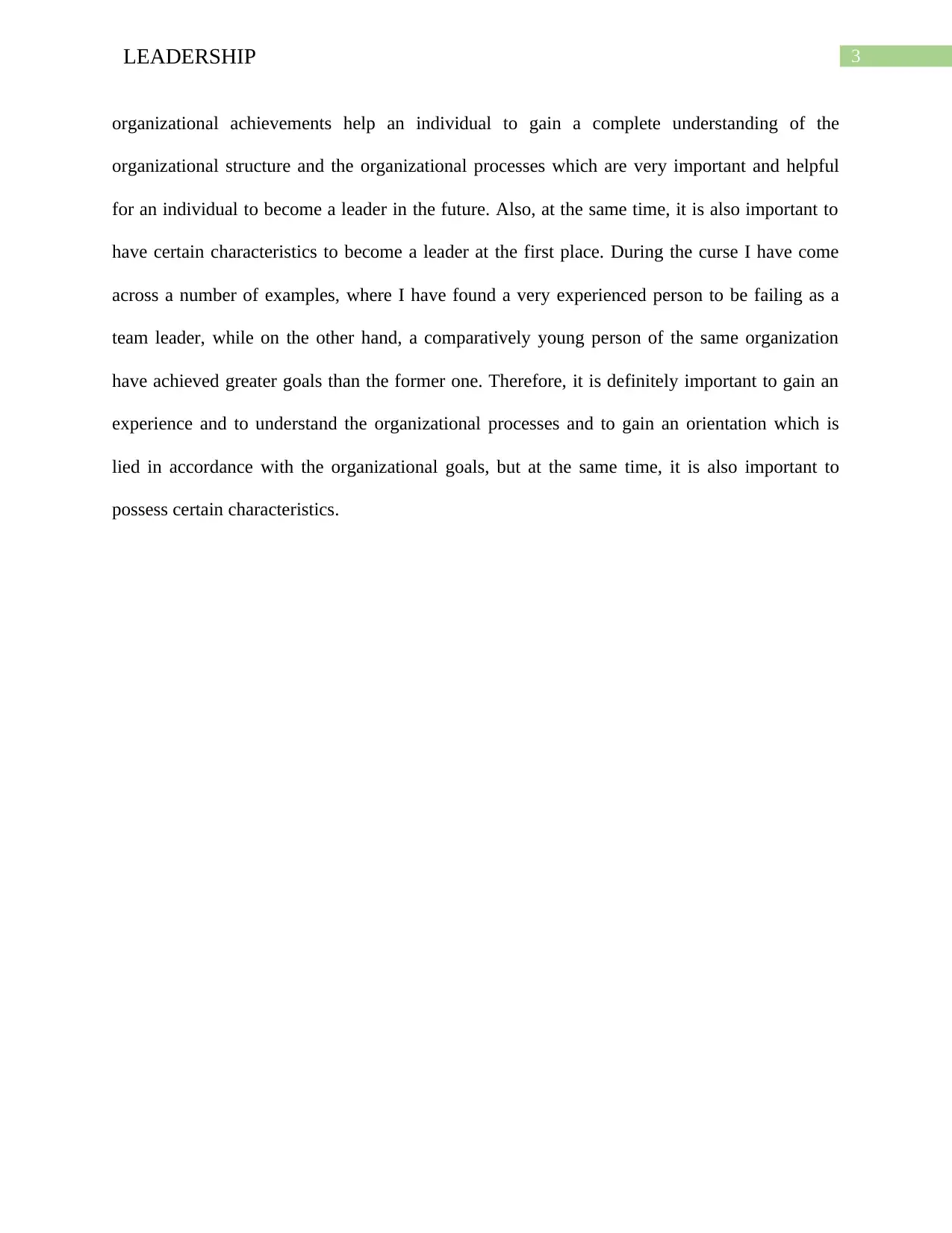
3LEADERSHIP
organizational achievements help an individual to gain a complete understanding of the
organizational structure and the organizational processes which are very important and helpful
for an individual to become a leader in the future. Also, at the same time, it is also important to
have certain characteristics to become a leader at the first place. During the curse I have come
across a number of examples, where I have found a very experienced person to be failing as a
team leader, while on the other hand, a comparatively young person of the same organization
have achieved greater goals than the former one. Therefore, it is definitely important to gain an
experience and to understand the organizational processes and to gain an orientation which is
lied in accordance with the organizational goals, but at the same time, it is also important to
possess certain characteristics.
organizational achievements help an individual to gain a complete understanding of the
organizational structure and the organizational processes which are very important and helpful
for an individual to become a leader in the future. Also, at the same time, it is also important to
have certain characteristics to become a leader at the first place. During the curse I have come
across a number of examples, where I have found a very experienced person to be failing as a
team leader, while on the other hand, a comparatively young person of the same organization
have achieved greater goals than the former one. Therefore, it is definitely important to gain an
experience and to understand the organizational processes and to gain an orientation which is
lied in accordance with the organizational goals, but at the same time, it is also important to
possess certain characteristics.
Paraphrase This Document
Need a fresh take? Get an instant paraphrase of this document with our AI Paraphraser
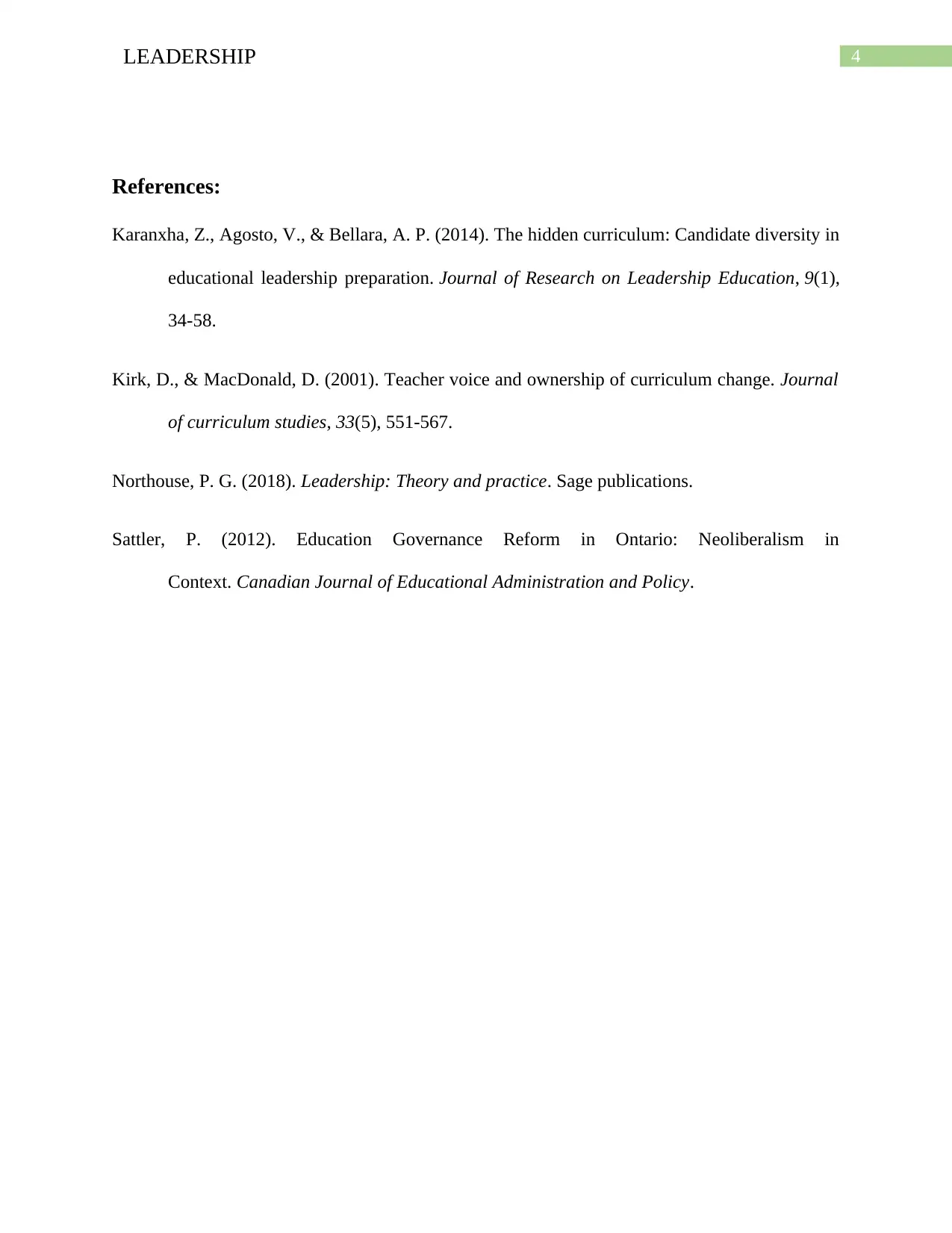
4LEADERSHIP
References:
Karanxha, Z., Agosto, V., & Bellara, A. P. (2014). The hidden curriculum: Candidate diversity in
educational leadership preparation. Journal of Research on Leadership Education, 9(1),
34-58.
Kirk, D., & MacDonald, D. (2001). Teacher voice and ownership of curriculum change. Journal
of curriculum studies, 33(5), 551-567.
Northouse, P. G. (2018). Leadership: Theory and practice. Sage publications.
Sattler, P. (2012). Education Governance Reform in Ontario: Neoliberalism in
Context. Canadian Journal of Educational Administration and Policy.
References:
Karanxha, Z., Agosto, V., & Bellara, A. P. (2014). The hidden curriculum: Candidate diversity in
educational leadership preparation. Journal of Research on Leadership Education, 9(1),
34-58.
Kirk, D., & MacDonald, D. (2001). Teacher voice and ownership of curriculum change. Journal
of curriculum studies, 33(5), 551-567.
Northouse, P. G. (2018). Leadership: Theory and practice. Sage publications.
Sattler, P. (2012). Education Governance Reform in Ontario: Neoliberalism in
Context. Canadian Journal of Educational Administration and Policy.
1 out of 5
Related Documents
Your All-in-One AI-Powered Toolkit for Academic Success.
+13062052269
info@desklib.com
Available 24*7 on WhatsApp / Email
![[object Object]](/_next/static/media/star-bottom.7253800d.svg)
Unlock your academic potential
Copyright © 2020–2026 A2Z Services. All Rights Reserved. Developed and managed by ZUCOL.




